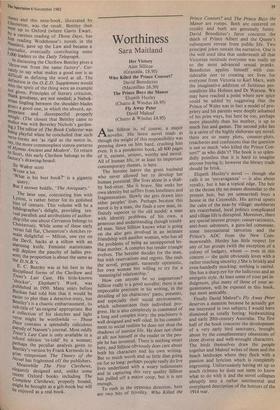Worthiness
Sara Maitland
Alan Sillitoe is, of course, a major novelist. His latest novel reads as though the weight of this responsibility was pressing down on him hard, crushing him even. It is a ponderous book, all 600 pages
of it, earnest, serious, worthy and moral. All of human life, or at least its important contemporary themes, is here. The heroine leaves the gross husband who never allowed her to develop her human potential. She lives alone in a shab- by bed-sitter. She is brave. She seeks her own identity but suffers from loneliness and fragmentation. Slowly she gets drawn into other peoples' lives. Perhaps because this novel is by a man, she finds a new man, in- finitely superior to the old model: a man with identity problems of his own, a generous and understanding though troubl- ed man. Since Sillitoe knows what is going on she also gets involved in an intimate friendship with another woman, who has all the problems of being an unsupported les- bian mother. A complex but tender triangle evolves. The heroine decides for the man, but with reservations and regrets. She ends the novel, pregnant, earnestly optimistic, her own woman but willing to try for a 'meaningful relationship.'
How can anyone be so ungenerous? Sillitoe really is a good novelist; there is an impeccable precision in his writing, in the detailing of his characters' pasts, presents, and especially their social environment, which substantiates their individual pro- gress. He is also completely in command of a long and complex story: the machinery is well designed and well oiled. In his commit- ment to social realism he does not shun the shadows of interior life. He does not cheat at all: not himself or the reader or the peo- ple he has invented. There is nothing smart here, and Sillitoe obviously does care about both his characters and his own writing. But so much worth and so little élan going on for so long: perhaps people really do live lives underlined with a weary tediousness and in capturing this very quality Sillitoe has pulled off a major coup, but it is not
enough.
To rush in the opposite direction, here are two bits of frivolity. Who Killed the Prince Consort? and The Prince Buys the Manor are romps. Both are centered on
royalty and both are genuinely funny.
David Benedictus's farce concerns the death of Prince Albert and the Queen's subsequent retreat from public life. Two principal jokes sustain the narrative. One is the well used idea that underneath all that Victorian rectitude everyone was really up to the most advanced sexual pranks. Benedictus applies himself with con- siderable zest to creating sex lives for everyone from Victoria to Karl Marx, with the imaginative addition of fictitious per- sonalities like Holmes and Dr Watson. We may have reached a point where new spice could be added by suggesting that the Prince of Wales was in fact a model of pro- priety and his parents were deeply ashamed of his prim ways, but here he too, perhaps more plausibly than his mother, is up to much fun and games. The second joke lies in a satire of the highly elaborate spy novel; there are so many plots, counter-plots, treacheries and confusions that the question is not so much 'who killed the Prince Con- sort?' as who didn't? The book is so splen- didly pointless that it is hard to imagine anyone buying it; however the library trade should be brisk.
Elspeth Huxley's novel — though she calls it an 'extravaganza' — is also about royalty, but it has a topical edge. The heir to the throne (by no means dissimilar to the present heir, but yet unmarried) buys a house in the Cotswolds. His arrival upsets the calm of the near-by village: snobberies are exacerbated, local politics complicated and village life is disrupted. Moreover, there are special interest groups: conservationists, anti-hunt saboteurs, a guru-led commune, some international terrorists and the Prince's ADC from the New Com- monwealth. Huxley has little respect for any of her groups (with the exception of a colony of badgers, whom — even in this context — she quite obviously loves with a rather touching sincerity.) She is briskly and even-handedly mocking: nothing is sacred. She has a sharp eye for the ludicrous and an energetic style. At least some of your pet in- dulgences, plus many of those of your ac- quaintance, will be exposed in this book, but most amicably.
Finally David Malouf's Fly Away Peter deserves a mention because he actually got me interested in two subjects I would have dismissed as totally boring: birdwatching and early 20th-century Australia. The first half of the book concerns the development of a very early bird sanctuary, brought about by the complimentary obsessions of three diverse and well-wrought characters. The birds themselves draw the people together and Malouf writes of them and the beach landscape where they flock with a passion and lyricism which is completely engrossing. Unfortunately having set up so much richness he does not seem to know what to do with it and the novel collapses abruptly into a rather sentimental and overplayed description of the horrors of the 1914 war.














































 Previous page
Previous page